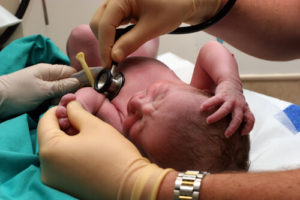Neonatal Hypoglycemia

Neonatal hypoglycemia occurs when a newborn child has excessively low blood sugar at, or within a few days after, birth. During pregnancy, a woman provides glucose – essential for fetal development and brain function – to her child via the placenta. At birth, a child’s body must compensate by deriving glucose from his or her liver as well as from food sources.
In a newborn inflicted with neonatal hypoglycemia, the glucose levels may drop for a variety of reasons, leading to a multitude of different signs and symptoms. If your child suffered preventable complications because your doctor failed to detect this condition, please call Stern Law, PLLC (800) 462-5772 to find out how we can help.
What are the causes and risk factors associated with neonatal hypoglycemia?
Neonatal hypoglycemia is believed to be caused by the following:
- Excess levels of insulin (hyperinsulinism) in a child’s body
- An insufficient amount of glycogen in a child’s body (this is the form in which glucose stores itself in the body)
- Not enough glucose production in the child’s body, or the body is using more glucose at a greater rate than it is capable of producing
- Inability of a child to feed enough to maintain his or her glucose levels
As for the risk factors associated with neonatal hypoglycemia, these are:
- An infection of the blood, known as sepsis
- Endocrine-related disorders such as hypothyroidism
- Inborn errors of metabolism
- Intrauterine growth restriction
- Hypoxia shortly after delivery
- Macrosomia
- A mother with diabetes
- A mother with chorioamnionitis or an infection right before or during a child’s birth
- Premature delivery
- A child that is small for his or her gestational age
What are the signs and symptoms of neonatal hypoglycemia?
Although not every child shows signs of neonatal hypoglycemia, others may experience the following:
- A bluish skin color, also known as cyanosis
- Difficulty breathing or pauses in breathing (apnea)
- Rapid breathing
- Problems regulating body temperature
- Decreased muscle tone, medically referred to as hypotonia
- Irritability
- Grunting
- Fatigue
- Listlessness
- Nausea
- Skin paleness
- Vomiting
- Poor feeding
- Sweating
- Shaking
- Tremors
- Seizures
What are the complications of neonatal hypoglycemia?
If a medical professional fails to diagnose and/or treat a child affected by neonatal hypoglycemia, it could cause permanent and potentially fatal medical complications, such as:
- Brain damage
- Developmental delays
- Heart failure
- Seizure disorders
How is neonatal hypoglycemia diagnosed?
If a child is suspected as having NH, there are a number of ways in which a medical professional can identify and confirm a diagnosis of the condition. These are:
- Blood test– A simple blood test that analyzes blood glucose levels can readily diagnose a case of NH. Specifically, a medical professional can draw blood from a child through the use of a heel stick, from the baby’s arm, or through a device known as an umbilical catheter (where blood is sampled from the umbilicus).
- Urinalysis – A urine test can also detect whether a child has neonatal hypoglycemia.
How is neonatal hypoglycemia treated?
The specific type of treatment for hypoglycemia will be determined by a medical professional based upon the following:
- Your child’s gestational age, overall health, and medical history
- Extent and severity of the condition
- Your child’s ability to tolerate medications, procedures and treatment
- Expectations for the course of the disease
- The opinions and preferences of a child’s parents
In consideration of the above factors, the most common treatment for NH includes providing an affected child with a rapid-acting form of glucose. This may be as simple as providing the child with a water/glucose mixture or formula, either by mouth or through the use of nasogastric lavage. Under certain circumstances, a baby may need to be administered with glucose intravenously, or IV. Subsequently, the baby’s blood glucose levels must be monitored closely after treatment to see if the hypoglycemia occurs again.
These forms of treatment normally last up to a week. However, some children may respond positively to treatment within a few hours. If a child’s blood sugar remains low, he or she may also receive medication to increase said levels (diazoxide) or to reduce the child’s insulin production (octreotide). Occasionally, newborns with severe forms of NH who fail to improve with treatment may require surgery to remove part of the pancreas in order to reduce insulin production.
How can neonatal hypoglycemia be prevented?
There are a few ways in which neonatal hypoglycemia can be prevented. Specifically, if a pregnant woman has diabetes, it is highly recommended that she work closely with her health care professional to regulate and control her blood sugar levels.
In addition, children who were diagnosed with neonatal hypoglycemia should be monitored after treatment to try to prevent it from reoccurring. These simple steps can save your child’s life and also spare them of needless disabilities and other serious conditions associated with NH.
Many times, the complications associated with neonatal hypoglycemia could have been avoided had the signs, symptoms and risk factors been immediately identified and addressed by competent medical professionals. If a doctor’s negligence caused your child to suffer harm from neonatal hypoglycemia, contact Stern Law, PLLC to discuss your legal options. We are available at (800) 462-5772 to answer your questions free of charge.







